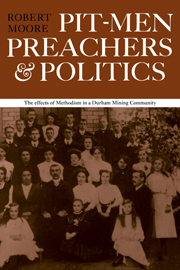Book contents
- Frontmatter
- Contents
- Dedication
- Acknowledgements
- List of abbreviations
- Introduction
- 1 Historical background
- 2 The Deerness Valley
- 3 The social and economic basis of paternalism: the colliery-owners in the Deerness Valley
- 4 Village Methodism – I
- 5 Village Methodism – II: the structure of the Methodist societies in the Deerness Valley
- 6 The respectable Methodists and the old Liberalism
- 7 The radicals and the Labour Movement, 1900–1926
- 8 Methodists in action: three political case studies
- 9 1970 – a postscript
- Conclusions
- Appendix I research strategy and techniques
- Appendix II the Methodist community and objections to Anglican union
- Appendix III the religious statistics
- Appendix IV occupational status, social mobility and the structure of Methodist leadership
- Notes
- Bibliography
- Glossary
- Index
4 - Village Methodism – I
Published online by Cambridge University Press: 24 November 2009
- Frontmatter
- Contents
- Dedication
- Acknowledgements
- List of abbreviations
- Introduction
- 1 Historical background
- 2 The Deerness Valley
- 3 The social and economic basis of paternalism: the colliery-owners in the Deerness Valley
- 4 Village Methodism – I
- 5 Village Methodism – II: the structure of the Methodist societies in the Deerness Valley
- 6 The respectable Methodists and the old Liberalism
- 7 The radicals and the Labour Movement, 1900–1926
- 8 Methodists in action: three political case studies
- 9 1970 – a postscript
- Conclusions
- Appendix I research strategy and techniques
- Appendix II the Methodist community and objections to Anglican union
- Appendix III the religious statistics
- Appendix IV occupational status, social mobility and the structure of Methodist leadership
- Notes
- Bibliography
- Glossary
- Index
Summary
BELIEFS
‘Religion’ cannot be defined adequately in terms of the single factor of belief; ritual, theology and subjective experiences are all religious phenomena, but none of them alone is religion as a whole. They may be parts of the whole life of the religious man, integrated more or less coherently in his mind or in his actions. Yet such religious phenomena are clearly separable for analytic purposes. Different elements of religion (doctrine, worship, ritual, etc.) are differentially related to what Nadel has called the ‘competences’ of religion. Doctrines may provide us with explanations of the cosmos, moral values or economic ethics. Worship may function to unite and sustain a congregation as a part or the whole of a wider social order. Ritual may recreate or symbolise the deepest subjective experiences of religion. In attempting to discover the competences or the effects of Methodism in our villages, we will adopt the relatively elementary procedure of Glock and Stark, who designated ‘dimensions’ of religious commitment.
According to Glock and Stark religion has an experiential aspect; the believer may have had a sense of the presence of God, and/or he may have had an experience of conversion. At a certain time, in a particular place, like John Wesley he ‘felt his heart strangely warmed’. Secondly, a believer may have more or less knowledge of theology, of the history and doctrine of his church; this we will call the intellectual aspect of belief.
- Type
- Chapter
- Information
- Pitmen Preachers and Politics , pp. 93 - 119Publisher: Cambridge University PressPrint publication year: 1974



